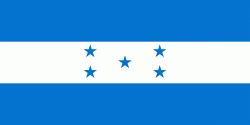Nacaome
Nacaome, with a population of 19,990 (2020 calculation), is the capital city of the Valle department of Honduras and the municipal seat of Nacaome Municipality. It is a manufacturing and commercial center located on the banks of the Nacaome River.
Nacaome is an old city founded when aboriginal Cholulas and Chaparrastiques, tired of fighting each other, thought it best to join together to build new houses in the middle of their territory on the west side of the Chapulapa River (the aboriginal name of the Nacaome River). They named the new town Naca-Ome, meaning "union of two races" in their dialects. In Nahuatl Naca means race or body and Ome means two. This foundation happened before the Spanish conquerors came.
Nacaome was affected by Hurricane Stan in October 2005.
At the time of the 2013 Honduras census, Nacaome municipality had a population of 57,345. Of these, 96.20% were Mestizo, 3.22% White, 0.47% Black or Afro-Honduran, 0.08% Indigenous and 0.03% others.
Nacaome is an old city founded when aboriginal Cholulas and Chaparrastiques, tired of fighting each other, thought it best to join together to build new houses in the middle of their territory on the west side of the Chapulapa River (the aboriginal name of the Nacaome River). They named the new town Naca-Ome, meaning "union of two races" in their dialects. In Nahuatl Naca means race or body and Ome means two. This foundation happened before the Spanish conquerors came.
Nacaome was affected by Hurricane Stan in October 2005.
At the time of the 2013 Honduras census, Nacaome municipality had a population of 57,345. Of these, 96.20% were Mestizo, 3.22% White, 0.47% Black or Afro-Honduran, 0.08% Indigenous and 0.03% others.
Map - Nacaome
Map
Country - Honduras
 |
 |
| Flag of Honduras | |
Honduras was home to several important Mesoamerican cultures, most notably the Maya, before the Spanish colonization in the sixteenth century. The Spanish introduced Catholicism and the now predominant Spanish language, along with numerous customs that have blended with the indigenous culture. Honduras became independent in 1821 and has since been a republic, although it has consistently endured much social strife and political instability, and remains one of the poorest countries in the Western Hemisphere. In 1960, the northern part of what was the Mosquito Coast was transferred from Nicaragua to Honduras by the International Court of Justice.
Currency / Language
| ISO | Currency | Symbol | Significant figures |
|---|---|---|---|
| HNL | Honduran lempira | L | 2 |
| ISO | Language |
|---|---|
| ES | Spanish language |















